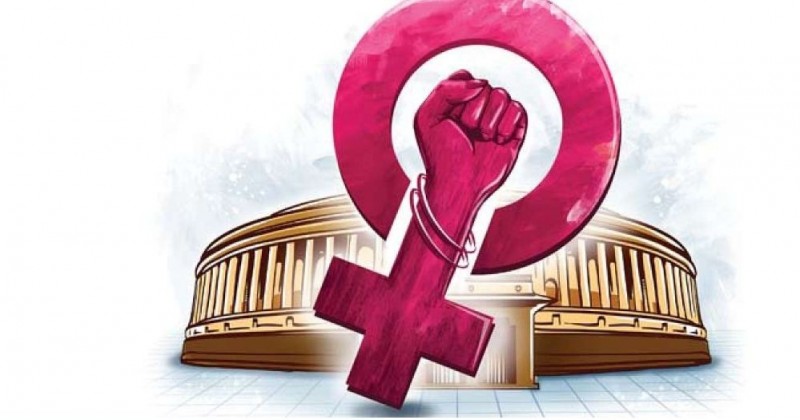
JACOB PEENIKAPARAMBIL – ARTICLE: The women reservation bill that provides for 33% reservation for women in Lok Sabha and legislative assemblies has been in limbo for more than a decade. The bill was passed by the Rajya Sabha on 9th March 2010, but did not go to the Lok Sabha. The bill was first introduced in the Lok Sabha in 1996 and later in 1998, 1999 and 2008. But the bill was lapsed with the dissolution of those governments that introduced the bill. Although all political parties in principle have accepted one-third reservations for women in the Lok Sabha and legislative assemblies, no party has shown the guts to get the bill passed by the parliament. The mail dominated political parties do not want to lose the grip of men on the political and administrative system.
If the political parties were sincere in their promise to give one third reservation to women, they could have implemented it in their own parties by allotting one third of tickets to women. Female representation in Parliament and the legislative assemblies in India is less than 15%, and in Rajya Sabha women make up only 11.6% in 2021. Globally, India ranks 148th in a list of 193 countries based on the percentage of elected women representatives in their national parliaments, as of June 2021.
At the same time, political parties had no hesitation to give 50% reservation to women in the three-tier Panchayati Raj system. At least 20 Indian states have given women 50% reservation in the Panchayati Raj Institutions. Many studies have shown that the Gram Panchayats headed by women, who are not controlled by their male counterparts, have done well on the governance front by focusing on issues like drinking water, sanitation, quality enhancement of ICDS centres, construction of village roads etc. Unfortunately, the political parties have failed or have been reluctant to take this experiment to the next level i.e. legislative assemblies and the parliament.
Against this backdrop, the announcement of Priyanka Gandhi, the Congress General Secretary in charge of Uttar Pradesh, that her party would reserve 40% of its electoral tickets for women in the forthcoming assembly election in UP, is to be seen as a bold step. While making this announcement on Tuesday 19th October she said, “If I had my way, I would have reserved 50% of the seats for women, and that may happen in the next elections. However, in the upcoming polls, our party has consensually decided to keep the women’s quota at 40%.”
The decision of the Congress party may have a much greater impact given UP’s staunchly patriarchal social and political setup. It is to be remembered that UP-based parties have either opposed the women’s reservation bill in the parliament or have only given halfhearted support. Samajwadi Party has strongly opposed the bill, while Bahujan Samaj Party had advocated introduction of SC/ST reservation within the women’s reservation bill. If the Congress allots 40% of its tickets to women, the other parties also will be in a way forced to give tickets to more women, even if the percentage may not reach 40, in order to attract women’s votes. The decision of the Congress can also affect the dynamics of UP politics which is currently very much dictated by caste and religious considerations. Even within major castes sub-castes are also demanding their share, and political parties try to appease different caste groups. This approach of appeasement will only further divide Indian society. By reserving 40% tickets to women Congress party can configure a constituency of women across castes and communities as one of the prominent stakeholders of UP politics.
More representation for women in parliament and legislative assemblies can lead to their increased representation in the council of ministers. Women have proved their talent and capacity in almost all fields. Out of the 14 district collectors of Kerala 9 are women. Women have broken glass ceilings and made a mark in every profession including those seen as male bastions. In a major step towards gender equality the Supreme Court had on August 18 allowed eligible women to take the examination for admission to National Defence Academy. If women can excel in all fields why not in politics?
Presence of more women in the legislative bodies can enhance the quality of discussions in the parliament and legislative assemblies. Moreover, issues related to women and children, especially education and health, can get more prominence in the discussions held in parliament and legislative assemblies with the increased presence of women in these bodies.
If the Congress can give tickets to 160 women of all castes and communities as its candidates in the forthcoming UP assembly election, the other parties will also be motivated to give more representation to women not only in UP but also in other states. Thus the political landscape of India can change and governance can become more people friendly, sensitive and inclusive. The culture of hate speech, mudslinging, character assassination and division can be replaced with a culture of respect for diversity and dignity of human beings and harmony among different communities. The mail dominated, aggressive, hate filled and divisive politics of today needs urgent change, and the declaration of Priyanka Gandhi can be seen as lighting a candle in the midst of darkness.
Read More Article from the Author Jacob Peenikaparambil:-